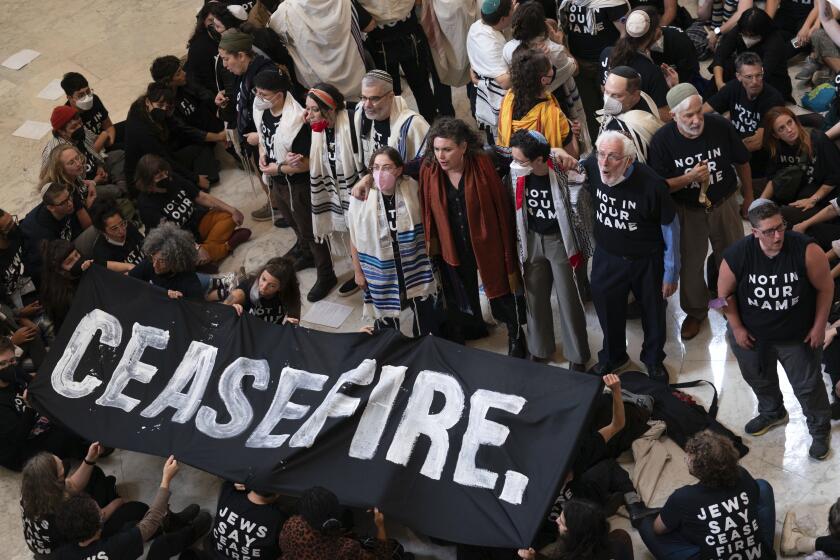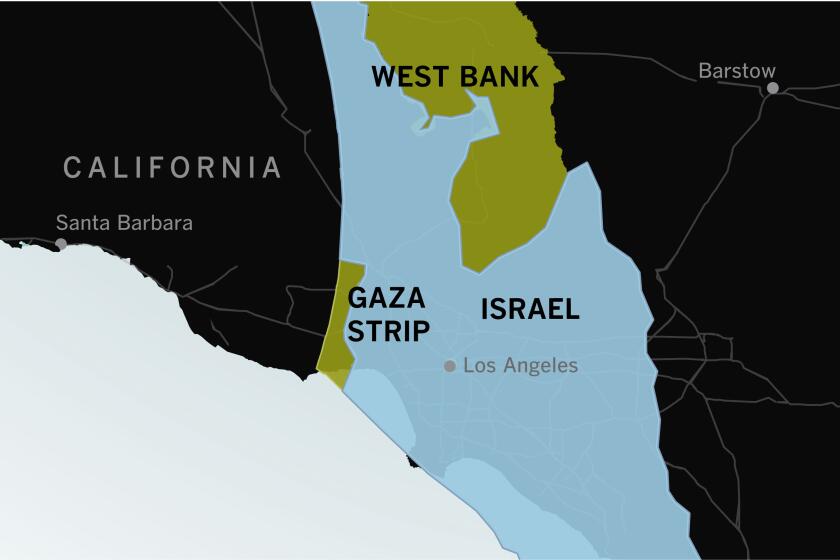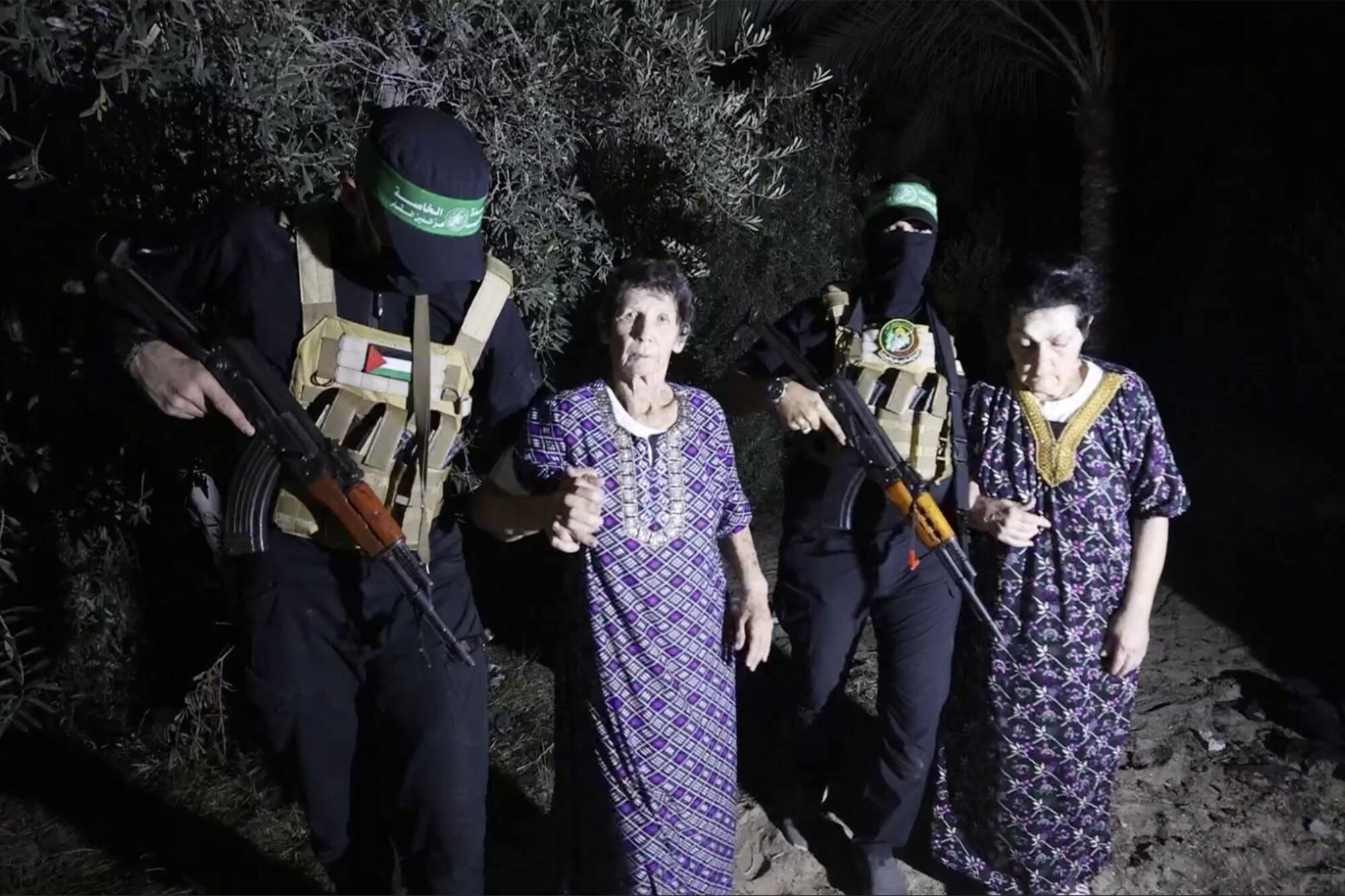
- Share via
DEIR AL BALAH, Gaza Strip — Hamas released two elderly Israeli women held hostage in Gaza on Monday, as the United States expressed increasing concern that the escalating Israel-Hamas war will spark a wider conflict in the region, including attacks on American troops.
The death toll in the Gaza Strip rose rapidly as Israel ramped up airstrikes, flattening residential buildings in what it says was preparation for an eventual ground assault. The U.S. advised Israel to delay an expected ground invasion to allow time to negotiate the release of more hostages taken by Hamas during its brutal incursion two weeks ago.
A third small aid convoy from Egypt entered Gaza, where the population of 2.3 million has been running out of food, water and medicine under Israel’s two-week siege. With Israel still barring entry of fuel, the U.N. said its distribution of aid would grind to a halt within days when its trucks run out of fuel. Gaza hospitals flooded by a constant stream of wounded are struggling to keep generators running to power life-saving medical equipment and incubators for premature babies.
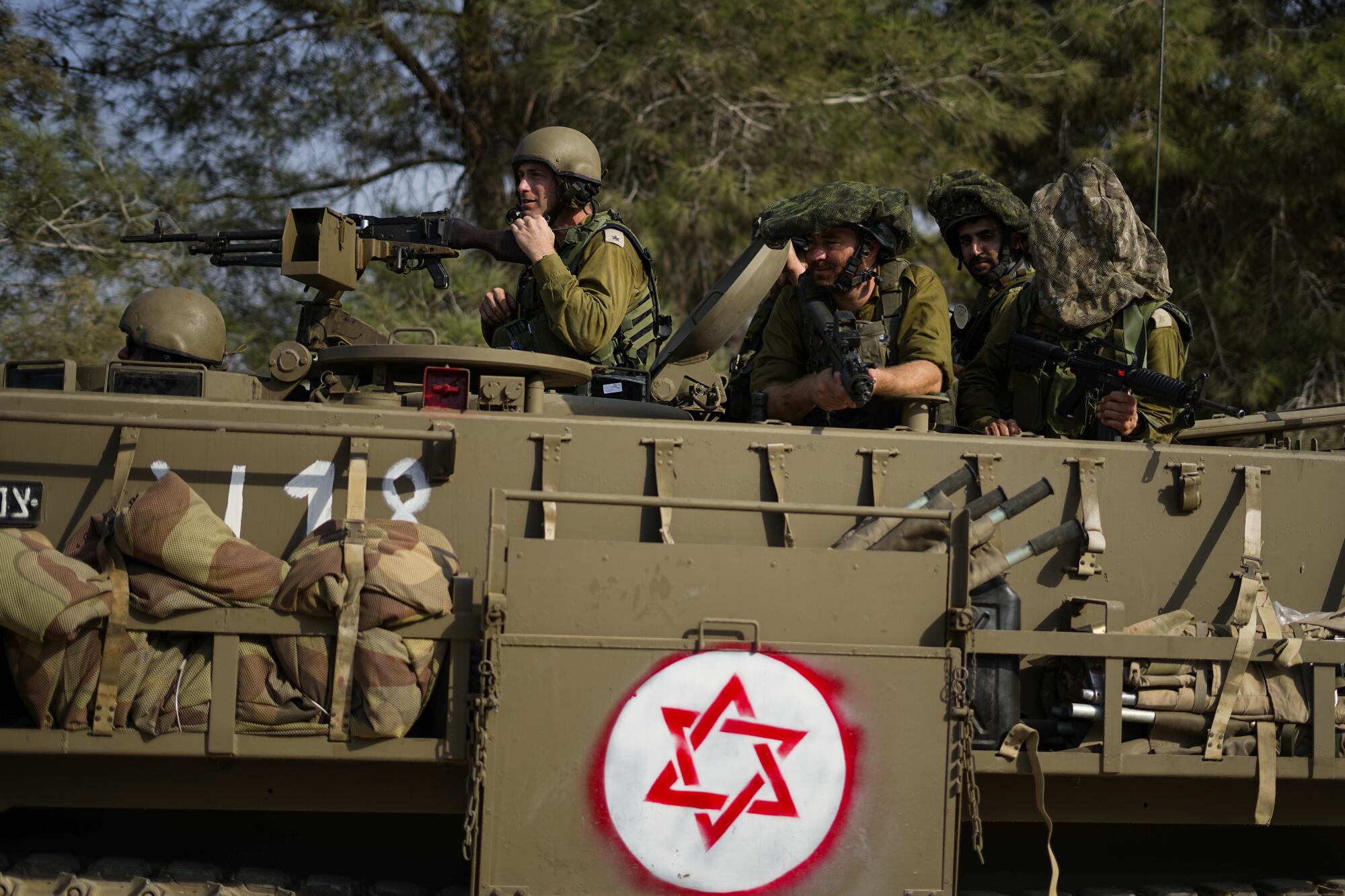
The two freed hostages, 85-year-old Yocheved Lifshitz and 79-year-old Nurit Cooper, were taken out of Gaza at the Rafah crossing into Egypt, where they were put into ambulances, according to video shown on Egyptian TV. The two women, along with their husbands, were snatched from their homes in the kibbutz of Nir Oz near the Gaza border during Hamas’ Oct. 7 rampage into southern Israeli communities. Their husbands were not released.
Hamas said it had released them for humanitarian reasons, days after freeing an American woman and her teenage daughter. Hamas and other militants in Gaza are believed to have taken roughly 220 people, including an unconfirmed number of foreigners and dual nationals.
‘Our human ask is that people give a damn when we die,’ said one rabbi. Amid the Israel-Hamas war, many U.S. Jews feel betrayed by people they thought were allies.
Israel is widely expected to launch a ground offensive in Gaza, vowing to destroy Hamas. Iranian-backed fighters around the region are warning of possible escalation if that happens, including targeting U.S. forces deployed in the Mideast.
The U.S. has told Iranian-backed Hezbollah in Lebanon and other groups not to join the fight. Israel and Hezbollah have traded fire almost daily across the Israel-Lebanon border, and Israeli warplanes have struck targets in the occupied West Bank, Syria and Lebanon in recent days.
National Security Council spokesman John F. Kirby said there had been an uptick in rocket and drone attacks by Iranian-backed militias on U.S. troops in Iraq and Syria, and the U.S. was “deeply concerned about the possibility for any significant escalation” in attacks in coming days.
He said U.S. officials were having “active conversations” with Israeli counterparts about the potential ramifications of escalated military action.
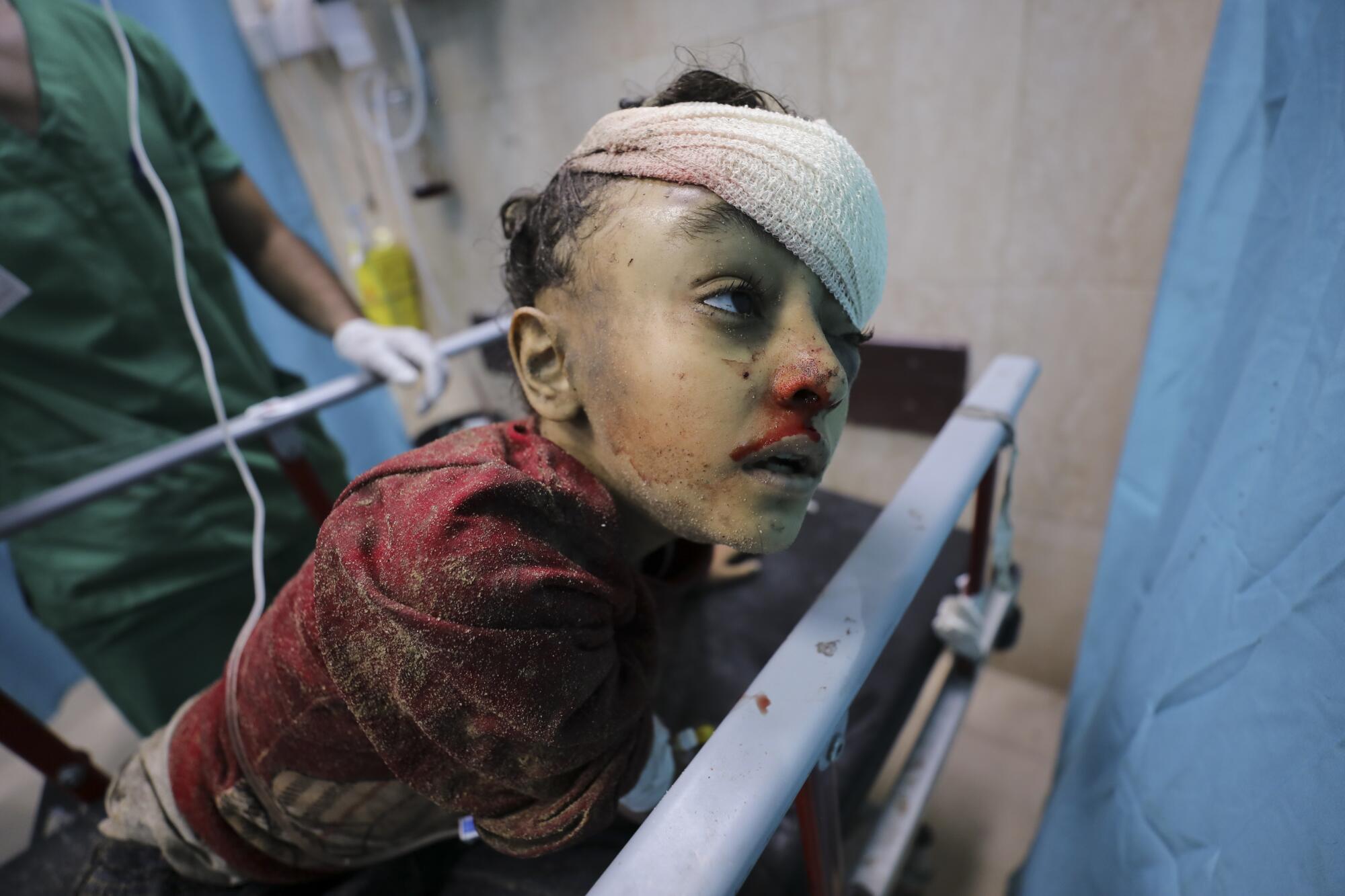
The U.S. advised Israeli officials that delaying a ground offensive would give Washington more time to work with regional mediators on securing the release of more hostages, according to a U.S. official.
Israeli tanks and ground forces have been massed at the Gaza border, and Defense Minister Yoav Gallant told troops there Monday to keep preparing for an offensive “because it will come.” He said it will be a combined offensive from air, land and sea but did not give a time frame.
A ground offensive is likely to dramatically increase casualties in what is already the deadliest by far of five wars between Israel and Hamas since the militant group seized power in Gaza in 2007.
Maps show that Israel and the Gaza Strip would cover only fractions of Southern California and the Los Angeles area, respectively.
More than 1,400 people in Israel have been killed — mostly civilians slain during the initial Hamas attack. At least 222 people were captured and dragged back to Gaza, including foreigners, the military said Monday, updating a previous figure.
More than 5,000 Palestinians, including some 2,000 minors and around 1,100 women, have been killed, the Hamas-run Health Ministry said Monday. That includes the disputed toll from an explosion at a hospital last week. The overall toll has climbed rapidly in recent days, with the ministry reporting 436 additional deaths in just the last 24 hours.
Israel said Monday that it had struck 320 militant targets throughout Gaza over the previous 24 hours. The military says that it does not target civilians, and that Palestinian militants have fired more than 7,000 rockets at Israel since the start of the war.
Maha Dakhil, a top agent at the Creative Artists Agency, whose clients include Tom Cruise, Natalie Portman and Ava DuVernay, stepped away from leadership roles after Israel-Hamas posts on social media.
Israel carried out limited ground forays into Gaza. On Sunday, Hamas said it destroyed an Israeli tank and two armored bulldozers inside the enclave. The Israeli military said a soldier was killed and three others were wounded by an antitank missile during a raid inside Gaza.
Intense airstrikes continued Monday across the territory. After a strike in Gaza City, a woman with blood on her face wept as she clasped the hand of a dead relative. At least three bodies were sprawled on the street, one lying in a gray stream of water. After a series of strikes in the south, Rafah’s Abou Youssef Al-Najjar Hospital registered 61 deaths Monday, its spokesperson said. Bodies of the dead were laid out on the hospital grounds, spokesperson Talaat Barghout said.
On Monday the Palestinian Red Crescent said 20 trucks entered Gaza carrying food, water, medicine and medical supplies through the Rafah crossing with Egypt, the only way into Gaza not controlled by Israel. It was the third delivery in as many days, each around the same size.
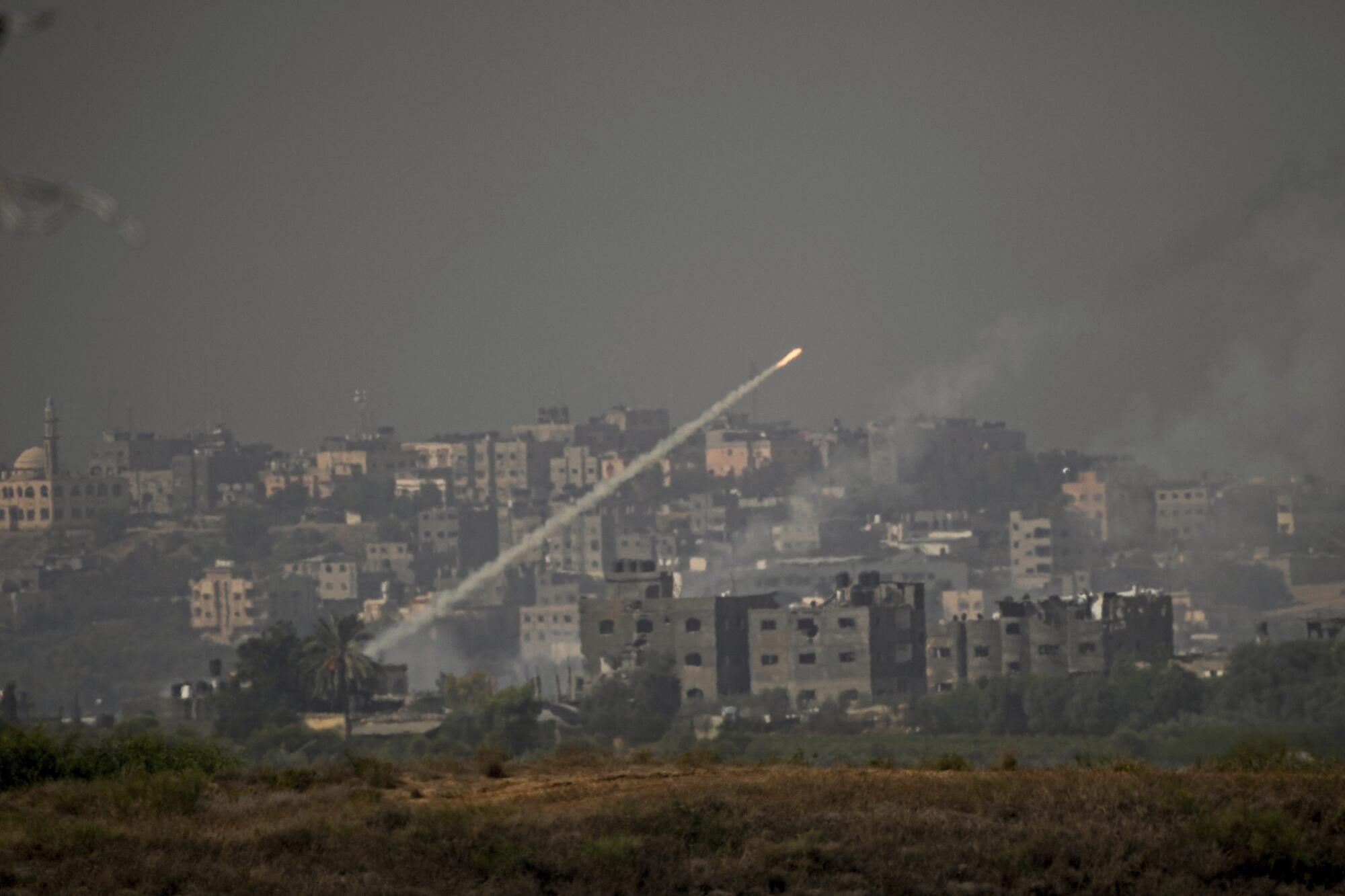
The aid coming in so far is “a drop in the ocean” compared with the needs of the population, said Thomas White, the Gaza director of the U.N. agency for Palestinian refugees, UNRWA. The U.N. has said that 20 trucks amount to 4% of an average day’s imports before the war and that hundreds of trucks a day are needed.
White said the agency had only three days of fuel left for its trucks. The supplies coming through Rafah are reloaded onto UNRWA and the Red Crescent trucks to take to hospitals and U.N. schools in the south of Gaza, where hundreds of thousands of people are taking shelter, running low on food and largely drinking contaminated water.
At least 1.4 million Palestinians in Gaza have fled their homes, and nearly 580,000 of them are seeking refuge in U.N.-run schools and shelters, the U.N. said Monday.
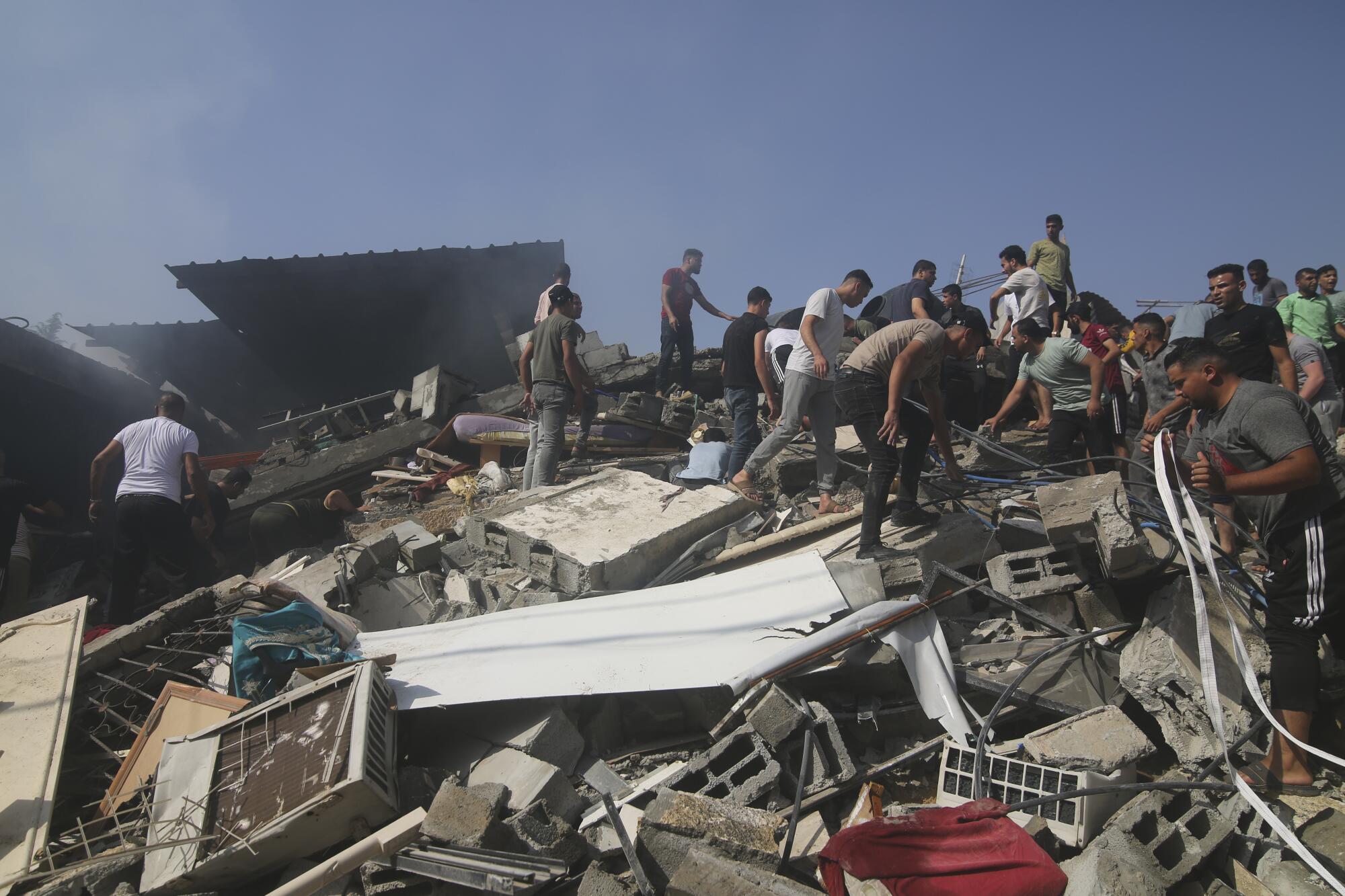
No aid will be distributed in Gaza City and other parts of the north, where hundreds of thousands of people remain. Gaza City’s Shifa Hospital, with a normal capacity of 700 patients, is currently overwhelmed with 5,000, and about 45,000 displaced people are gathered in and around its grounds for shelter, the U.N. said.
“The north didn’t receive anything” from incoming aid, said Mahmoud Shalabi, a worker with the Medical Aid for Palestinians group based in the northern town of Beit Lahiya. “It’s like a death sentence for the people in the north of Gaza.”
Magdy reported from Cairo and Krauss from Jerusalem. Associated Press writers Wafaa Shurafa in Deir al Balah, Gaza Strip; Aamer Madhani in Washington; Amy Teibel in Jerusalem and Brian Melley in London contributed to this report.
More to Read
Sign up for Essential California
The most important California stories and recommendations in your inbox every morning.
You may occasionally receive promotional content from the Los Angeles Times.
